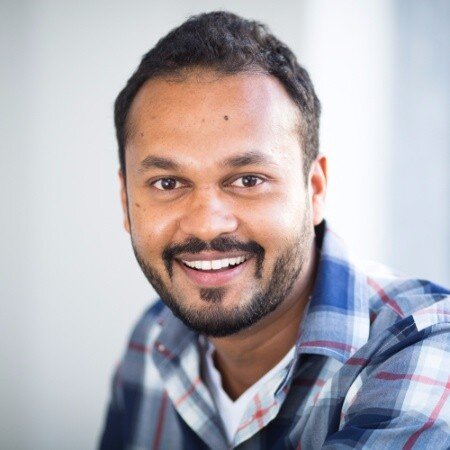2019 Training - Participant Reflections
Kanishka Ratnayake
ASIA PROGRAM DEVELOPMENT SUPPORT & LEARNING COORDINATOR, OXFAM SRI LANKA
“The training was a mental Jiujitsu, as I was trying to unlearn and relearn the nuances of different approaches to innovation...”
The first time I had heard of IDIA was from a former participant who posted about the training online. I was intrigued and reached out to him to know more about the program and its benefits. Looking back, I am so glad I made the call and turned in my application. The excitement for the week-long immersive program in Härnösand- Sweden was one thing, the selection criteria to get in was another. I found those screening questions to be purposeful and required thoughtful reflection on my part. Fast forward a few months, I was part of June 2019 cycle and found myself in a cohort of 24 participants from 10 countries. We were selected to build capacity for impact at scale and champion the discourse on “Doing International Development Differently.”
During this week-long immersion, we explored topics from Mapping Problem Space, Business Models and Scaling Capacity, System Theory, and Communicating Innovation. The curriculum was designed using a blended learning approach with a touch of gamification. The evenings brought us together to explore different challenges, unpack bureaucracies, navigate problem spaces, and explore innovation pathologies in our own work. I would say, 144 hours, 8640 minutes, and 518400 seconds spent at SIDA’s Training Facility, was a social impact hackathon for the curious mind. It was challenging, inspiring and informational.
The training was an eye opener in many ways. As we dissected innovation in the social impact space, my perceived knowledge on “innovation management” flipped on its head. The discourse rewired my brain as we peeled off the layers of innovation management. A day didn't go by without experiencing an “Aha” moment. Professor Christian Seelos (Stanford University), a lecturer of the most humbled kind cautioned “don’t try to innovate, if you cannot set yourself up for learning.” From now on, as I fail forward, I lead with curiosity where Innovation is carefully approached, breathed and lived essentially as a matter of learning. In her delivery on the concept of “System Change,” Dr. Anna Birney (School of Systems Change at Forum for the Future) bright lined “there are no separate systems –the world is a continuum” and “The systems are not broken.” Sitting there I realized, so often we rationalize our inactions by taking refuge on the belief that systems are broken. This lecture stimulated us to step back, understand the mechanics and invited us to embrace the change of perspective. Similarly, Mwihaki Muraguri (Paukwa House) led us through a session on “Storytelling”. This session made some participants disconcerted as we were asked to present a story how personal experiences have led us to our work in international development. It made us drop our guard to look in on us, to share personal and most inspiring stories. The session was a much-needed reminder to share positive stories, keep continuing the work with passion and purpose.
In some ways, the training was a mental Jiujitsu, as I was trying to unlearn and relearn the nuances of different approaches to innovation. My previous experience working at a mission driven startup in San Francisco, our approach to innovation was the lean start-up framework driven by a culture to fail fast to innovate faster. Soon it was clear to me that it may hold true to a company with a product mindset but does not hold the same way for a social enterprise. Prof. Seelos, brilliantly shepherded the discourse on “innovation and scaling”. Guided by his extensive field research, he concluded, it's not about “failing fast” but failing forward with learning and doing more of learning is how unique social enterprises launch pad their greatest social impact. As Professor eluded, if we are in service to marginalized communities that had been plagued for decades with normative, cognitive and power dynamics, the stakes are too high to go all in with Silicon Valley style disruptive approaches. The training shaped my approach to innovation upholding the values of “do no harm.”
On a RoI level, I experienced early wins as soon as I returned to my work desk. I gained confidence and the language to approach the leadership of my organization to discuss how we could explore innovation in our projects. He commended me on my direction and approach. A highlight that came out of this meeting was that he agreed to reach out to HQ requesting additional funding to test and explore innovative ways to deliver value in our programs.
Here I save the best for last, to give a shout out to my amazing cohort. The richness of the training was culturally amplified, thanks to an array of vibrant voices from different parts of the globe. Practitioners, donors, academia and even few sceptics in one room added up to a super rewarding learning experience. Even more so, having great personalities made the week fun, memorable and exciting. It made it even harder to part our ways come final day. It is worthy to note that the participants were asked to take the Neethling Brain Instrument (NBI) Assessment, prior to the training. This exercise greatly helped to forge a strong camaraderie and a conducive learning environment. All communications, negotiations, and interactions were respectful and intelligent.
The IDIA experience left me enchanted, inspired and hungry to explore more. IDIA has given me some solid contacts that I would never have made otherwise. I envision knowledge sharing and future collaborations with my fellow participants. I am grateful for the conceptual leads, Tom Feeny & Kippy Joseph, and the amazing faculty for holding the space for such rewarding experiential learning.

